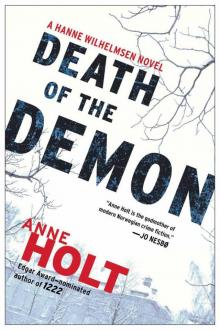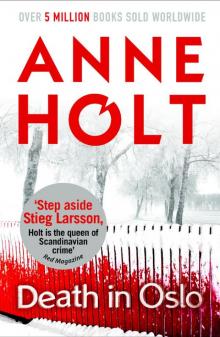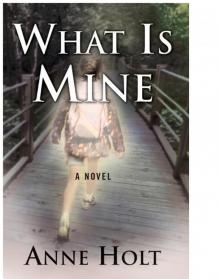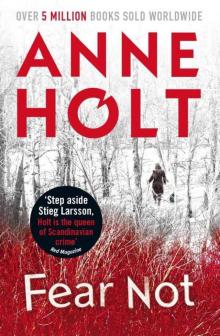A Grave for Two Read online
Page 20
She should speak to Jan Morell. Find out if he had told anyone about their unusual wager. It was close to midnight, so she dropped the idea of ringing him now.
She would contact him tomorrow. As early as possible, she decided, as she speeded up across the Ekeberg hillside. In the middle of the bend leading to Gamlebyen, a thought struck her so suddenly that she forgot to check in her mirror before changing lane. A collision with a German camper van was avoided only by the skin of her teeth, and she saw the driver give her the finger.
The tracks in the two gardens had been left deliberately, Selma realized.
There had been no attempt to hide them.
On the contrary.
Every single day in the past ten-to-twelve days had featured the same, bleak weather alternating between rain and frost, between wet snow and sheet ice. The media reported that the orthopaedic department at Ullevål hospital was catastrophically overcrowded, and the newspapers were filled with daily moans about the council’s failure to spread grit on streets and pavements.
The man in the ski boots had left clear footprints. He had chosen to wear distinctive boots: an ordinary bootprint would not have identified him so emphatically in both places. In Vettakollen and Ormsundveien, he had chosen to turn up while the slush was still thick enough to leave a trail, but late enough so that they would freeze fairly rapidly to leave identifiable prints. They were placed in the middle of the driveway in both places as well as distinctly across the lawn.
There had been no intention to stake out the place or steal anything, Selma realized, tenaciously struggling to focus on her driving.
The man in the ski boots wanted to cause fear and alarm.
He was determined to frighten someone, and that someone could not be anyone other than Selma.
To be honest, he had succeeded.
THE BONFIRE
‘To think it’s possible. To think it’s at all possible, Hege. Bloody hell.’
Jan Morell sat on his dark leather settee, squeezing a tennis ball in each hand. He was speaking more quietly than his words might suggest.
‘To tell the truth, this is the most idiotic thing you’ve done in the whole of your twenty-four-year-old life. Why … why didn’t you come …’
His jaw muscles were bulging under his day-old beard, his knuckles white around the dirty yellow balls. The sweat rings in the armpits of his tennis shirt, pale pink with a white stripe across the chest, had dried into dull stains rimmed with salt.
‘Why didn’t you come to me?’ he asked. ‘Haven’t I said that you must always, always, come to me when you’re faced with a problem?’
Hege did not answer. There was nothing more to say. She sat on the settee directly opposite him and had been in endless floods of tears since she’d come running in from the evening darkness to discover that the tube of Trofodermin was no longer where she had left it, tucked away inside the air vent in the bathroom, hidden behind the broken grate, and forgotten to the best of her ability.
‘I’m so worn out, Dad.’
‘We both are. Even so, that’s of no importance. We have to sort this out, we have to …’
He stood up. Lobbed one of the tennis balls into a corner. Both Maggi and Hege jumped and followed the ball with their eyes as it bounced off the wall and rolled back, to disappear under the nearest settee.
Jan stuffed the other ball in the pocket of his pull-on trousers as he crossed to the fireplace. An overly large fire that filled nearly the entire hearth was burning furiously. The fireguard was not high enough to stop the glowing red flakes that sparked out into the room, and Jan grabbed a Farris bottle he had left on the mantel-piece. Shaking it energetically, he unscrewed the lid and placed his thumb over the spout, before showering a fine spray on the floor beyond the wrought-iron floor panel and then directing a couple of forceful jets on the fire itself.
‘That’s it, then,’ he murmured almost inaudibly, holding out his hand and issuing an order: ‘The tube. Now.’
Maggi had stood upright for more than two hours, halfway between the living room and the kitchen, as she was afraid it would become necessary for her to flee. She approached him. Obviously anxious, Hege saw; every step was hesitant. Finally she withdrew the empty, dented tube of ointment from her apron pocket. Jan had looked at it several times in the course of the evening, but hadn’t wanted to touch it until now. Snatching it from her, he pushed it so far into the flames that he had burned his fingers before he let it go.
‘There,’ he said resolutely, waving Maggi away. ‘In a few minutes it’ll be gone. Completely gone. And we’ve never set eyes on it. Understood?’
The home help nodded energetically, already almost at the kitchen door.
‘And you?’
He looked at his daughter.
She did not bat an eyelid. Her weeping had subsided at last and her eyes stared into space. She was trying to picture her mother. Hege struggled to catch the scent of her mother, at night, when she came in with water and sat on the edge of her bed until sleep overtook her again.
It was impossible.
‘What did Sølve say?’ Jan Morell demanded.
‘I’ve already told you. At least five times.’
‘And now I want to hear it again.’
Hege reached out for the glass of water on the polished concrete table. Took a sip and then sat twirling the glass in her hand.
‘He asked about what I had hidden in the air vent in my bathroom.’
‘And you said?’
‘Nothing.’
‘Did you say “Nothing,” or did you say nothing?’
‘I said nothing. Didn’t answer him at all.’
‘Why didn’t you deny it? Why didn’t you say that …’
‘Dad!’
The exclamation turned into a screech. She slammed the glass of water on the table and covered her face with her hands.
‘Can’t we stop this? How long do we have to sit here and …’
‘Just as long as I say so.’
Her father was unrecognizable.
Jan Morell could be excessively inflexible. Abrupt and impatient. All the same, there was always something restrained about him, something that held him back when he was close to breaking point. Hege had never experienced her father losing his cool, even though he had become considerably more authoritarian since her mother’s death. She imagined it must be impossible to build up a million-kroner business without having control over the last, dangerous button on his temperament. Now his face was deep red. He slammed the other tennis ball on the floor.
‘And you!’
His trembling forefinger was pointed in Maggi’s direction.
‘I’ve given you house room here for more than twelve years,’ he spluttered. ‘You’ve had a better life than you could ever have dreamed of. Under my roof. With a generous, legal wage. And you repay me by being so disloyal as to run to Sølve Bang …’
He spat the name out into the room as he made for the sideboard along the windowless main wall.
‘Of all the windbags in the whole universe you had to go to Sølve Bang, no less. In order to … ask for advice!’
His voice distorted into an imitation of Maggi’s.
‘You have to come to me if you’re in doubt about anything!’
Throughout the evening, Maggi had been virtually silent. She had given short, succinct answers to all of Jan’s questions, that was all; she was still in shock over the initial, blazing dressing-down she had received when he had arrived home around half past nine and got to hear of what had happened. Otherwise, she had not even attempted to console Hege each time she had burst into another wild paroxysm of weeping.
‘What did he do when you didn’t answer?’
It was Hege he was looking at now, before opening a drawer and extracting an unopened pack of Marlboro cigarettes.
‘He asked again,’ she said. ‘I still didn’t reply. Then he claimed to have information from a reliable source that I had used a banned medication contai
ning Clostebol. And that I had hidden it in the air vent. In the bathroom. My bathroom.’
‘And then?’
He fumbled in annoyance with the cellophane.
‘I …’
She took a deep breath and leaned back in the settee with her shoulders drooping. On the back of her left hand, a vein was throbbing just beneath the skin. Dark-blue and frighteningly distinct.
‘I said I didn’t want to talk to him. That he should get in touch with you. Idiotic of me, of course, because you didn’t know anything about this, but I couldn’t think of anything else. Then he said he was obliged to take the matter further. That it was his moral duty. That his loyalty was to the system. To the Federation. Always. He continued with a whole lot of …’
Suddenly she turned around on the settee and looked her father straight in the eye.
‘He came out with a lot of high-flown drivel. About truth. Integrity. Clean sports. That sort of stuff.’
‘But you didn’t confirm anything, then?’
He took a cigarette from the pack and headed back to the fire-place.
‘No. I hung up. And jumped off the tram one station early. Ran home. Checked the air vent. The tube was gone. And then …’
She looked at Maggi.
‘… Maggi came in and asked what was wrong. I told her, and she admitted that she had taken the tube. And spoken to Sølve. In good faith, Dad. In good faith.’
Jan Morell lit the cigarette. Took a deep drag, and coughed a little. He was holding the cigarette as if it was the first time he had ever smoked, at the very end between the forefinger and middle finger of his right hand. He was staring intently at the embers glowing amongst all the grey ash.
Silence descended on the room, a protracted silence.
Hege had never seen her father smoke. She knew he had been a heavy smoker from his youth, despite his interest in skiing, but that he had stopped all of a sudden when her mother had asked him to. Hege had also noticed that there was always an unopened pack in the sideboard, among the napkins and candles. A long time ago, when she was a child, she had asked him why. The answer was that it was to remind him of how stupid he had once been. This couldn’t be entirely true, since it wasn’t an ancient pack he had just opened.
‘This simply never happened,’ he finally declared. ‘There has never been some strange ointment in your sponge bag, Hege. You never emptied it out into the toilet. You never hid it in the air vent, and Maggie never found it. It’s not been burned in the fire, because it has never existed. Sølve can claim whatever he likes, but he’ll be left looking like an idiot if he divulges it without any proof.’
He wheeled around to face the two women, one standing pitifully at the kitchen door, the younger one completely deflated on the settee.
‘We deny it. Understood?’
‘No.’
‘What?’
‘Dad …’
Hege got to her feet.
‘I can’t bring myself to lie, Dad. I’m no good at it, anyway. We should instead find out who put that tube in my luggage. If we find the person concerned, then we find the saboteur. He or she has somehow …’
‘You let me take care of all this. As far as you’re concerned, none of this ever happened.’
‘No. I refuse to lie. The girls in the team will believe me. They know I’m not guilty. They’ve been sending me text messages. Hedda phoned me today. They’re supporting me, Dad, they …’
‘The girls in the team? The girls in the team?’
Again that darkness in his eyes.
‘Do you think it’s the girls in the team who’ll decide this case? Do you think Hedda Bruun has anything whatsoever to say about it? That she can do anything about the tribunal’s handling of the case? Does Hedda sit on the panel of judges? Or on the CAS, if it should go that far?’
He was quite literally tearing out his hair.
‘Athletes should just perform, Hege. You know that. The system only functions if you fall into line, do as expected and win medals. You get drummed into you words such as ‘winner culture’, ‘solidarity’ and ‘community solutions’, to prevent the most precious of you from stealing most of the cake for yourselves. But those thoughts go only one way, Hege. They should go both ways. Because where are those boys now? Where are Bottolf and his gang now that you’ve been hung out to dry? Where’s their solidarity now? If it gets out that you’ve been walking around with a tube …’
‘I’m not going to lie,’ Hege broke in.
She padded towards the kitchen. She took hold of Maggi’s hand on the way and pulled her along. The door slid open.
‘Then Maggi’s days here with us are numbered,’ she heard behind her.
Sudden stop.
‘Maggi is fired,’ Jan Morell said. ‘Now. As of today.’
‘You don’t mean that, Dad. You just can’t do that.’
‘Yes, I can. I want both your and Maggi’s word that you’ll forget this whole thing. That bloody tube has never existed. If you don’t go along with that, then Maggi can start packing.’
Hege still stood with her back to her father. Maggi’s hand, frail and warm, was held in hers.
‘Dad …’
‘Yes or no?’
Maggi released her hand. Tenderly caressed Hege’s cheek. She smiled, as if everything was fine and nothing terrible had happened.
‘I can go,’ she whispered. ‘I’ll manage. I’ve saved up …’
‘OK,’ Hege said in a loud voice. ‘Maggi stays. You have my word of honour.’
She turned around abruptly and took three steps towards her father.
‘But soon that’s all you’ll have.’
THE MANUSCRIPT
501 INTERIOR, TOILET CUBICLE, DAYTIME
The MAN sitting crouched on a toilet seat with the lid down. The cubicle door is unlocked, but almost closed. The MAN is dressed in jeans and a college sweater. VOICES can be heard.
INTERIOR, COMMUNAL WORKS TOILETS
VANJA and a female COLLEAGUE are standing by an open window. They are both smoking cigarettes, and making sure that the smoke is blown outside, where gusts of wind are fluttering yellow and red leaves on a tree in the back yard.
VANJA: I’m not exactly afraid. But I feel a certain distaste. No, a strong distaste. Enough to tell me it’s time to stop.
COLLEAGUE: But is it advisable? I mean … for him? How long has he actually been coming to you?
VANJA: Six months or so. I thought it had been going well so far.
COLLEAGUE: What happened, exactly?
VANJA: He identified one of them. In a newspaper photograph from the Ski Museum last spring. The opening of an exhibition. ‘Skiing in Norway through Four Thousand Years’. Or something like that.
COLLEAGUE: He surely can’t be sure. Wasn’t he just a young child when it all happened?
VANJA: Yes. Seven years old. Of course he can’t be certain, even though he himself is convinced. He says it had something to do with a pair of skis. Very special, the very first fibreglass skis he had. Or rather, his brother’s skis.
VANJA taps ash out of the window. Her COLLEAGUE inhales and then drinks from a mug of coffee she has placed on the window ledge.
VANJA (cont.): It could well be that a particular event could trigger the memory. In this case it was a connection between a pair of black Madshus skis and something that was said.
COLLEAGUE: Was the actual incident initially suppressed? Are we dealing with a dissociative disorder?
VANJA: No. Definitely not, as I see it. He remembers everything that happened at that time. In detail, in fact. We’ve gone through it many times. My aim has been to get him to realize that he can’t go on carrying around the guilt. That in actual fact it’s irrelevant to talk about guilt, since he was only a little child. And that, regardless of what happened to his parents afterwards, it’s certainly not his responsibility.
COLLEAGUE: So the incident at the Ski Museum was simply a matter of … identification?
VANJA: Yes. Fairly
straightforward. He was too young when it all took place to know for certain who they were. Besides, he moved away not long afterwards to another part of the country. With his father.
COLLEAGUE: At that time? In the seventies? Surely it wasn’t usual to stay with the father in those days?
VANJA: No. And the accident, the divorce and a difficult upbringing from then on affected him. But being affected is not the same as being ill. A couple of times I’ve considered the idea of a bipolar disorder. Until the moment he saw the photo from the Ski Museum, he seemed quite depressed. Since then, he’s been more … aggressive. Almost manic. But we’re not talking about mood swings. Just … a change. He’s definitely excessively preoccupied with symmetry. Purely physically, I mean – he wants to place chairs and cups and God knows what in perfect balance. But it’s more a kind of … hang-up rather than a real compulsion. I’m sure of that. My conclusion was that he would benefit from CBT.
VANJA takes one last puff, stubs out her cigarette on the brick wall outside the window and pinches the butt.
VANJA (cont.): The photo from the Ski Museum was sheer association. The sight of the skis unlocked his recognition of the man. Almost as if you had met Solveig Gulbrandsen in the street in ordinary clothes and had no idea who she was. But if you spotted her with a football under her arm …
COLLEAGUE: Who is Solveig Gulbrandsen?
VANJA: Forget it. Shall we go?
Her COLLEAGUE turns on the tap at the basin and lets the water run over her cigarette butt. She throws it into the rubbish bin. Turns on the hot water and starts to wash her hands.
COLLEAGUE: I still don’t know what you’re scared of.
VANJA: Me neither. It’s just …
VANJA heads for the door, stops and stares thoughtfully into the distance.
VANJA (cont.): Something’s come over him that I can’t understand. He’s changed. He’s far more intense. Persistent. The other day he was waiting for me at my home! Outside, in the street. I mean, if it had been a crisis, or a serious illness, then there are no limits to what I would accept. But as I said, he’s not ill. Not by my reckoning. Some of his problems for all these years have mainly centred on a lack of social skills. Difficulty in being accepted by people. In letting them get close to him. He’s not married, and he’s scarcely ever come near a female, I think. He probably has a slightly difficult, not to say repressed, relationship with women. Often feels rejected. It was possibly quite traumatic for him not to be allowed to stay with his mother after the accident. Understandable. But now he seems almost …

 A Grave for Two
A Grave for Two Dead Joker
Dead Joker Death of the Demon: A Hanne Wilhelmsen Novel
Death of the Demon: A Hanne Wilhelmsen Novel Punishment aka What Is Mine
Punishment aka What Is Mine Beyond the Truth
Beyond the Truth Death in Oslo
Death in Oslo The Blind Goddess
The Blind Goddess What Never Happens
What Never Happens 1222
1222 In Dust and Ashes
In Dust and Ashes Odd Numbers
Odd Numbers What is Mine
What is Mine What Dark Clouds Hide
What Dark Clouds Hide Blessed Are Those Who Thirst
Blessed Are Those Who Thirst Fear Not
Fear Not No Echo
No Echo Hanne Wilhelmsen - 01 - The Blind Goddess
Hanne Wilhelmsen - 01 - The Blind Goddess